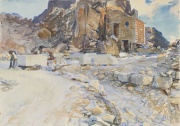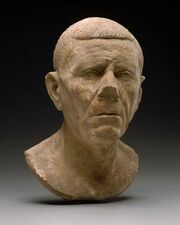Difference between revisions of "Carrara marble"
Jump to navigation
Jump to search
| (2 intermediate revisions by 2 users not shown) | |||
| Line 1: | Line 1: | ||
| − | [[File:12.244-SC96420.jpg|thumb| | + | [[File:12.244-SC96420.jpg|thumb|Carrara quarry<br>MFA# 12.244]] |
== Description == | == Description == | ||
| − | + | [[File:1972.15-SC35622.jpg|thumb|Roman urn<br>MFA# 1972.15]] | |
A famous, fine-grain, white [[marble]] quarried in the Carrara district of the Apuan Alps in Italy since the 2nd century BCE. Carrara marble has a compact, crystalline grain that gives it a translucent, sugary appearance. Its colors range from pure white to a pale creamy color. Michelangelo carved many of his sculptures from this marble since it was a local stone. | A famous, fine-grain, white [[marble]] quarried in the Carrara district of the Apuan Alps in Italy since the 2nd century BCE. Carrara marble has a compact, crystalline grain that gives it a translucent, sugary appearance. Its colors range from pure white to a pale creamy color. Michelangelo carved many of his sculptures from this marble since it was a local stone. | ||
| − | + | [[File:1991.534-SC1073.jpg|thumb|Roman bust<br>MFA# 1991.534]] | |
== Synonyms and Related Terms == | == Synonyms and Related Terms == | ||
| Line 11: | Line 11: | ||
<gallery> | <gallery> | ||
| − | |||
| − | |||
File:image5_carraramarble.jpg|Carrara marble | File:image5_carraramarble.jpg|Carrara marble | ||
</gallery> | </gallery> | ||
| − | + | ==Resources and Citations== | |
| − | == | ||
* ''Dictionary of Building Preservation'', Ward Bucher, ed., John Wiley & Sons, Inc., New York City, 1996 | * ''Dictionary of Building Preservation'', Ward Bucher, ed., John Wiley & Sons, Inc., New York City, 1996 | ||
| Line 25: | Line 22: | ||
* Random House, ''Webster's Encyclopedic Unabridged Dictionary of the English Language'', Grammercy Book, New York, 1997 | * Random House, ''Webster's Encyclopedic Unabridged Dictionary of the English Language'', Grammercy Book, New York, 1997 | ||
| − | * | + | * John Herrmann, MFA, Contributed information. |
* Janet Burnett Grossman, ''Looking at Greek and Roman Sculpture in Stone'', J. Paul Getty Trust, Los Angeles, 2003 | * Janet Burnett Grossman, ''Looking at Greek and Roman Sculpture in Stone'', J. Paul Getty Trust, Los Angeles, 2003 | ||
Latest revision as of 15:37, 20 May 2022
Description
A famous, fine-grain, white Marble quarried in the Carrara district of the Apuan Alps in Italy since the 2nd century BCE. Carrara marble has a compact, crystalline grain that gives it a translucent, sugary appearance. Its colors range from pure white to a pale creamy color. Michelangelo carved many of his sculptures from this marble since it was a local stone.
Synonyms and Related Terms
lunense (Lat.); luniense (Lat.); luna marble; Italian statuary; Bianco P; Blanco P; marbre de Carrare (Fr.); mármol de Carrara (Esp.); mármore de Carrara (Port.); Carrara Marmor (Deut.)
Additional Images
Resources and Citations
- Dictionary of Building Preservation, Ward Bucher, ed., John Wiley & Sons, Inc., New York City, 1996
- Luciana and Tiziano Mannoni, Marble: the history of a culture, Facts on File Publications Comment: 2nd century BC
- Random House, Webster's Encyclopedic Unabridged Dictionary of the English Language, Grammercy Book, New York, 1997
- John Herrmann, MFA, Contributed information.
- Janet Burnett Grossman, Looking at Greek and Roman Sculpture in Stone, J. Paul Getty Trust, Los Angeles, 2003
- Joel Leivick, Carrara. The Marble Quarries of Tuscany, Stanford University Press, Stanford, California, 1999 Comment: First quarried by Romans in 155 BC
- R. Mayer, The Artist's Handbook of Materials and Techniques, Viking Press, New York, 1981
- G.S.Brady, Materials Handbook, McGraw-Hill Book Co., New York, 1971 Comment: p. 499
- Ralph Mayer, A Dictionary of Art Terms and Techniques, Harper and Row Publishers, New York, 1969 (also 1945 printing)



